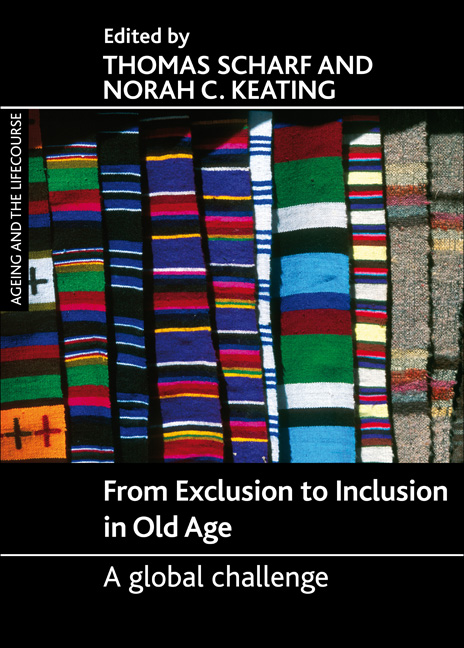Book contents
- Frontmatter
- Dedication
- Contents
- List of tables and figures
- Acknowledgements
- Notes on contributors
- Foreword
- one Social exclusion in later life: a global challenge
- two Globalisation, economic recession and social exclusion: policy challenges and responses
- three International migration: patterns and implications for exclusion in old age
- four Social inclusion of older people in developing countries: relations and resources
- five Exclusion from material resources: poverty and deprivation among older people in Europe
- six Social inclusion of elders in families
- seven The impact of changing value systems on social inclusion: an Asia-Pacific perspective
- eight Age discrimination as a source of exclusion in Europe: the need for a human rights plan for older persons
- nine Towards inclusive built environments for older adults
- ten Revisiting social exclusion of older adults
- Index
five - Exclusion from material resources: poverty and deprivation among older people in Europe
Published online by Cambridge University Press: 07 September 2022
- Frontmatter
- Dedication
- Contents
- List of tables and figures
- Acknowledgements
- Notes on contributors
- Foreword
- one Social exclusion in later life: a global challenge
- two Globalisation, economic recession and social exclusion: policy challenges and responses
- three International migration: patterns and implications for exclusion in old age
- four Social inclusion of older people in developing countries: relations and resources
- five Exclusion from material resources: poverty and deprivation among older people in Europe
- six Social inclusion of elders in families
- seven The impact of changing value systems on social inclusion: an Asia-Pacific perspective
- eight Age discrimination as a source of exclusion in Europe: the need for a human rights plan for older persons
- nine Towards inclusive built environments for older adults
- ten Revisiting social exclusion of older adults
- Index
Summary
Introduction
The contexts in which the future generation of older people will be living – and for which we have evidence on poverty and the shifts that are likely to happen in their future income entitlements – are precarious. Europe's pension systems still have a long way to go to reach the goal of securing financial sustainability, making it difficult to be entirely optimistic about the future. The financial crisis of 2008/09 arising from failures in the regulation of banks in a number of Western nations, the ensuing economic recession of 2009 and 2010, and then the most recent public finance and Euro debt crisis, have had a negative impact on the employment, income and personal welfare of households. Inevitably, this includes the households of many older people in European nations.
Against this background, this chapter addresses the exclusion from material resources experienced by many older people living in European Union (EU) countries. The chapter explores some of the conceptual, measurement and policy issues that help, and sometimes hinder, the realisation of the goal of enhancing older people's social inclusion. Thus, in exploring the current situation regarding older people's exclusion from material resources, and particularly in light of ongoing pension policy reforms (Martin and Whitehouse, 2008; Economic Policy Committee, 2009a, 2009b; Zaidi, 2011), we are able to provide a baseline for future analyses.
The chapter is premised on the idea that while social exclusion for older people might take a range of forms, being excluded from material resources often acts as a key catalyst in a process that leads to involuntary detachment from participation in society or becomes an initial indicator of other forms of social exclusion. In practical terms, inadequacy in pension income first reduces an individual’s standard of living below a decent level. Lack of resources subsequently impinges on other social domains, and combines with factors common to the experience of old age, such as frailty and the onset of disability, to impede a person's capacity to participate in the society in which they live.
The chapter is organised into five sections. First, key conceptual and measurement issues regarding poverty, deprivation and the broader theme of social exclusion are reviewed. Second, the salient features of three different approaches to measuring older people's exclusion from material resources are outlined.
- Type
- Chapter
- Information
- From Exclusion to Inclusion in Old AgeA Global Challenge, pp. 71 - 88Publisher: Bristol University PressPrint publication year: 2012

